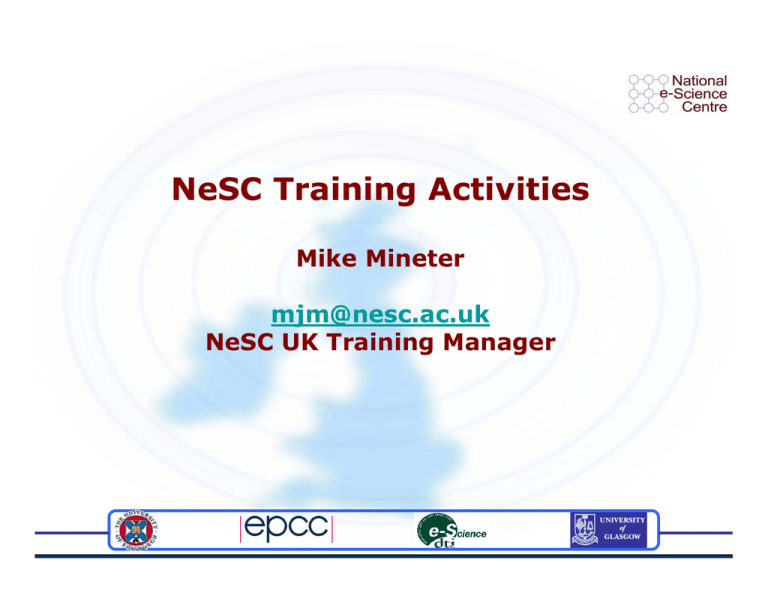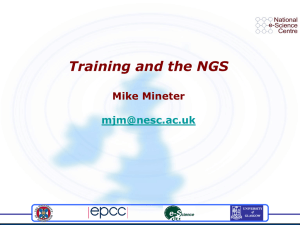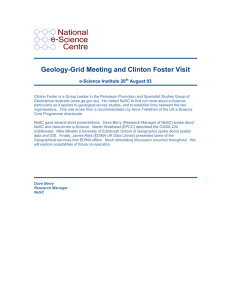NeSC Training Activities Mike Mineter NeSC UK Training Manager
advertisement

NeSC Training Activities Mike Mineter mjm@nesc.ac.uk NeSC UK Training Manager Overview NeSC training Objectives What we’ve done so far Imminent UK training activities Observations – some of what we’ve learnt in the last 6 months Plans NeSC training mission Enabling, facilitating and delivering quality training in the UK and Internationally Dominant Training requirements For users Orientation Use of middleware For operations / sites Installation Resource centres Networking Grid infrastructure Operations, Support and training Collaboration Network infrastructure linking resource centres Training is vital!! Technology is (generally) released from a small number of people in one location Goal: many users in many locations Need to make this feasible and scalable “Routine” training Early trainers developers Repository web-based users Objective: Gaining new and effective users NeSC training: The story so far Quality events since NeSC opened The NeSC training team was formed in April 2004 to build on this tradition Grown to five trainers Supported by EU (EGEE), UK core e-Science Programme, and Research Council grants (PPARC) Leader: Prof. Malcolm Atkinson EU training manager: David Fergusson UK training manager: Mike Mineter Major activities since April Initial emphasis was on EGEE (also April start-up) Leading and coordinating EGEE training activity Building collaboration across training teams Establishing relationships with technology developers and operations teams Delivering training in UK and Europe Creating repository of training material Attention also now turning to UK NGS, GOSC and also OMII and JISC Courses delivered The training team has directly delivered: 5 training events in the UK (35 trainees - advanced) X X At NeSC and the University of Stafford For JISC and EGEE 6 training events in Europe (183 trainees – introductory/advanced) X X At CERN, FZK Karlsruhe, CNB Madrid, Lithuania and Italy. GGF Summer School Also dissemination presentations to introduce people to the concept of the grid Training event types Induction EGEE and [Q1, 2005] NGS, OMII Advanced users WS, portals, … Operations - Sites and Regional Ops. Centres NeSC role: facilitation, to date… LCG-2 / EGEE-0 installation X Rhys Newman, Oxford; Ruediger Burlich, Karlsruhe; Flavia Donno, CERN Web services deployment X Hong Ong (Univ. of Portsmouth) and Ariel Goyeneche (Univ. of Westminster) Workshops hosted Condor week, GOSC/NGS meeting On demand: GT3 for example Future: Training trainers Based on experience of training events Training event types Induction EGEE and [soon] NGS, OMII Advanced users WS, portals, … Operations - Sites and Regional Ops. Centres NeSC role: facilitation, to date… LCG-2 / EGEE-0 installation X Rhys Newman, Oxford; Ruediger Burlich, Karlsruhe; Flavia Donno, CERN Web services deployment X Hong Ong (Univ. of Portsmouth) and Ariel Goyeneche (Univ. of Westminster) Workshops hosted Condor week, GOSC/NGS Future: Training trainers Based on experience of training events Imminent UK training activities Two-day induction for NGS users Dry-run: December 9-10th Modules will be made available via NeSC repository (1Q 2005) Willing to contribute to training at the UK eScience centres and other centres of excellence WSDL and UML for JISC e-Learning Web Services December 16-17th WS-RF: February 2005 Proposed NGS Induction What is grid computing Concepts, world-wide, EU and UK EGEE induction Security, AAA LCG-2 /EGEE-0 middleware Practical with GENIUS / GILDA Operations, (human) networking, middleware activities (WS and gLite) Overview of: NGS OGSA-DAI Oracle service SRB NGS Portal Overview NeSC training Objectives What we’ve done so far Imminent UK training activities Observations – some of what we’ve learnt in the last 6 months Observations Event goals must match reality so an event is a point of departure for participants Useability, reliability, sustainability… are key goals of NGS and EGEE – but trainers need to set expectations accurately whilst the infrastructure is established. Modes of training Scope for group-work, more interactive Modes of learning Different people like to learn in different ways – seen most intensely in practicals Developers are recognising need to support training But scalability is an issue – hence trainer training and repositories are vital! Need for a training Grid For EGEE, GILDA is hosted by Univ. of Catania (led by Roberto Barbera) For NGS…? May initially rely on the production system Also, installation courses Massive requirements for hardware 20 people, LCG installation course = ideally 100 PCs ! Feedback We use forms to rate Achievement of goals (stated in event announcement) Quality of each talk … Free text comments often most useful Might also try multiple choice “exam” Reinforce learning Objective assessment of what is communicated / remembered Event statistics Need KPIs From participants Numbers Number of organisations, disciplines, countries Summary of feedback But really need caution before comparing assessments (whether between talks or between events) Involvement in research projects In order to maintain a high level of technical awareness the members of the training team are actively involved in research projects linked to NeSC BRIDGES EDINA and NERC Grid/GIS Working Group Future plans for NeSC training EGEE – tomorrow’s talk by David Fergusson Education: contributing to the e-Science MSc at Edinburgh University from next October Installing a training grid for EGEE and NGS Deliver widening spectrum of events Repository: Our material is available for re-use - but please with attribution and with feedback and statistics of use, via methods to be determined…!! We include non-NeSC material too! – same conditions would apply More on this tomorrow! This event is a sign of our commitment to cooperate and collaborate in establishing training across the UK

